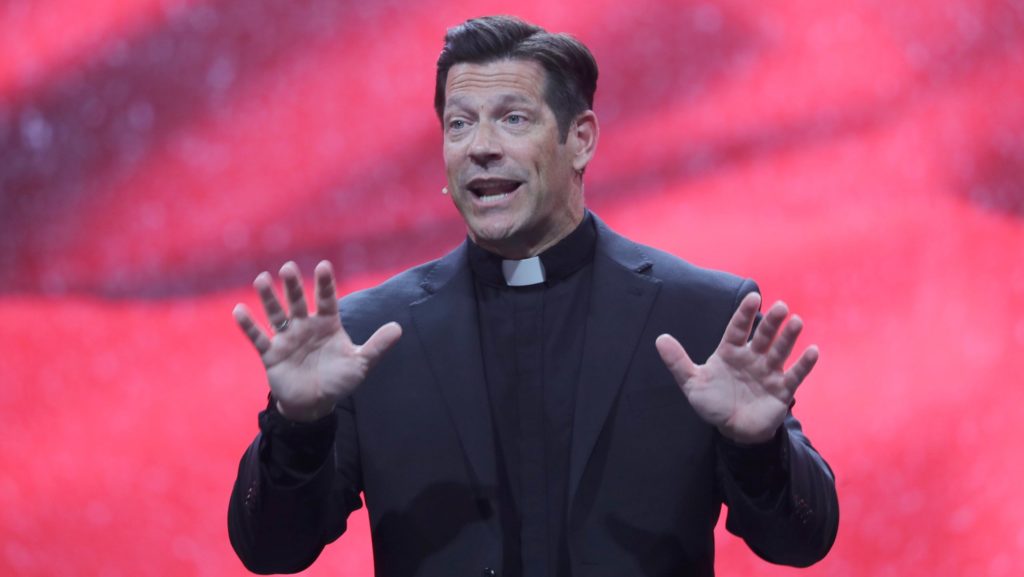A centuries-old devotional book, said to be the second most circulated in the history of Christianity after the Bible, is, perhaps fittingly, the work that Father Mike Schmitz of "The Bible in a Year" fame had long hoped to focus on in a podcast.
Because of the book's significance in his own life, he was eager to bring "The Imitation of Christ" to people in an approachable way.
Father Mike told OSV News that he felt lucky when he was chosen to host the fourth season of the "Catholic Classics" podcast focusing on the 15th-century spiritual classic. The new podcast, which premiered Oct. 22 and is free on the Ascension app, guides readers through "The Imitation of Christ" in 30 days.
He had his own rocky start with reading the great spiritual classic penned by the German novice master Thomas á Kempis. "I think I started 'Imitation of Christ' a dozen times or more before I actually finished it," he recalled.
He has heard from others who started and stopped the book at first as well. "One of the reasons I think that people get stopped on it is because it's so dense," he said, "you could take one line and reflect on it for a couple weeks. And so this is meant to be an introduction to the book as a whole so that then you can go back and say, 'OK, so let me take the time and now digest.'"
After beginning the book in high school, he returned to it regularly over the course of college and seminary because he found it to be a great source of inspiration.
"The point of this entire work that Thomas á Kempis wrote was not just here's a holy thought or here's a pious practice, but here's how we become like Jesus," he said, "that being the critical piece is pretty important."
He highlighted the impact the work had throughout history on great saints in the church, including St. Thérèse of Lisieux, who wrote that, for a time, "it was the only book which did me good," and that she was teased by her family for memorizing it. St. Thomas More reportedly believed it was one of three books every Catholic should own, and St. Ignatius of Loyola was greatly influenced by the book and "never wished to read any other devotional book," recommending it to everyone.

Father Mike called the work's influence on St. Ignatius of Loyola "incredible" because "his work, his writing, has shaped the prayer life of so many people," saying, "when you have a style of prayer named after you, Ignatian prayer, you're the prayer guy but to realize that here's someone like Ignatius of Loyola who this (book) shaped his interior life."
He pointed out that the work is an excellent starting point for people from all walks of life because Thomas á Kempis wrote it as an instructional work for novices.
"Many of us would see ourselves in that place of 'I'm a beginner. I'm not exactly sure how to do this whole discipleship thing,'" he said. "Imagine having a novice master who's going to walk along with you and say, 'OK, keep this in mind: Everything passes away so if I'm living for something that is impermanent, I'm living for the wrong thing.'"
"It speaks both to those people who are novices, the beginners who just need some guidance, as well as to those who realize … 'these are the fundamentals that I need that maybe I've forgotten, maybe I've dismissed, or maybe I just kind of need to be hauled back to,'" he said. "That's part of its timelessness and its longevity."
Father Mike said that the "uncompromising way" Thomas á Kempis presents the path to imitating Christ "can come across to some people as harsh," and while some temperaments or personalities could be discouraged by that, it's part of the work's honest tone that's ultimately meant to encourage.
"If someone were to read this and to end with, 'Oh my gosh, I'm a terrible person, I have no hope' then I'm reading it wrong,'" he said, emphasizing that the book "is for people who are falling short," to realize "this was written for me, not to be discouraged or condemned, but so that I can have that redirection and encouragement."
Father Mike believes the work's admonitions against vain curiosity and worldly distractions are timelier than ever with the advent of social media and streaming services that offer endless distraction.
"When he was writing, 600 years ago, and he's talking about the reputation or the opinion of others and not seeking after those kinds of things," he said. "Back in that time, the reputation, the opinions of others would be the few people around you." Now we have "not just those people who are close to us, but also hundreds or thousands of people who may see us online" and "the desire to want to influence or to be impactful or to be thought well of, it just gets amplified."
He added that when it comes to the book's advice on avoiding distraction, "you have a limited number of options a couple of centuries ago versus virtually unlimited options right now for distraction, endless distraction."
So it's "more important than ever, but also maybe even more challenging, which is one of the reasons why no one should read this and get discouraged," he continued, because "we are, in so many ways, just like every other age. But, in a lot of other ways, we are living in a unique time where it is even more challenging to be able to kind of hold the center and keep the Lord at the center."
Father Mike also discussed the work's emphasis on keeping our deaths in mind throughout our lives.
"I think there's a really practical wisdom about beginning with the end in mind," he said, "recognizing that the end of every one of our lives is death and judgment, and, after that judgment, heaven or hell."
"It's the unavoidable reality for every one of us," he said, "we can put off thinking about, well, at some point the ride's going to be over," but "at some point, we stand before the Lord and say, 'okay, God, this is what I've done with what you gave me.' And I think that is not only very sobering but it's a necessary sobering in that sense that without that we will never become who we were meant to be."
Father Mike pointed out that death is foreign to us when "we haven't had a lot of contact with the fragility of life." He recalled witnessing a young man die suddenly at an athletic event and seeing how unsettling his death was for the young people attending who had to confront the reality of death even for someone their own age.
He said the reminder that death is part of this life for every one of us "is not morbid but is sobering," and while morbid thoughts "can sometimes lead to a depression or to a sadness," a sobering reflection on the reality of death "leads me to clarity and that leads me to purpose."
"Once we realize that I don't have infinite time here," he said, we are in a position to ask, "How am I going to live it in such a way that I end up looking like Jesus?" -- which is "the whole heart of 'Imitation of Christ,'" the priest added.
Father Mike said that ultimately, he hopes the podcast offers listeners, through the timeless wisdom of this great novice master, a "very important step" along the path of imitating Christ.

